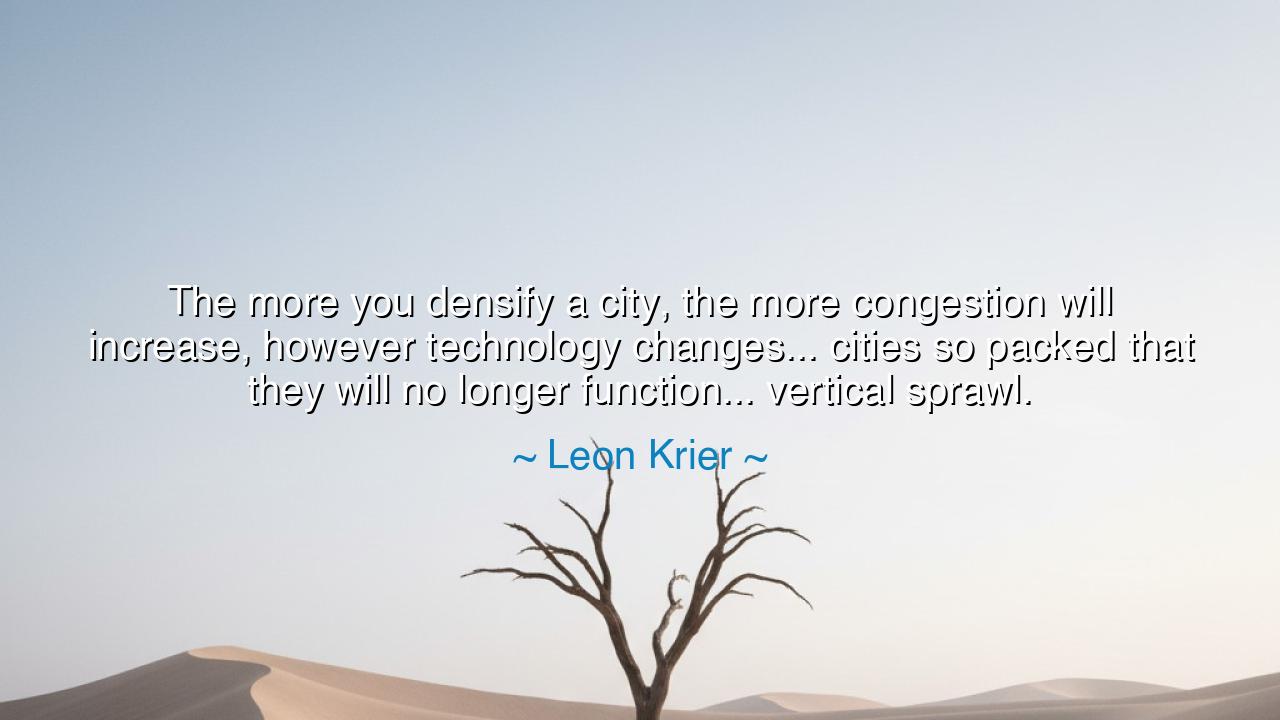
The more you densify a city, the more congestion will increase
The more you densify a city, the more congestion will increase, however technology changes... cities so packed that they will no longer function... vertical sprawl.






Leon Krier, master of architecture and critic of modern excess, once warned: “The more you densify a city, the more congestion will increase, however technology changes... cities so packed that they will no longer function... vertical sprawl.” In these words lies a vision not only of buildings and roads, but of the very balance between human life and space. He speaks against the blind pursuit of density, where towers rise higher and streets grow tighter, yet the soul of the city suffocates under its own weight.
The origin of this insight rests in Krier’s lifelong battle against the faceless architecture of industrial modernity. He saw how cities, once formed to nurture community, beauty, and balance, were increasingly transformed into mechanical hives. Where the ancients built forums, gardens, and temples to sustain civic life, the modern mind too often stacks humanity into glass towers. He named this fate vertical sprawl—not an expansion outward into open land, but upward into steel and concrete, producing not harmony but congestion, alienation, and dysfunction.
History gives us examples both of flourishing cities and of their collapse. Consider Rome, at the height of its empire. Its aqueducts, roads, and forums made it a marvel of the world, yet as it densified and grew without limit, disease, overcrowding, and corruption of infrastructure set in. The city that once held a million souls fell into disrepair, and its citizens fled to the countryside. The lesson is timeless: a city that forgets the limits of balance will eventually betray its people.
Krier’s warning is sharpened by our age of technology. We believe that faster trains, taller skyscrapers, and smarter networks will solve congestion, but he reminds us that technology alone cannot redeem flawed design. A city that piles its people too closely, without regard for space, air, and human scale, will choke no matter how advanced its machines. True wisdom lies not in endless densification but in creating environments that breathe, where citizens walk freely, where public squares invite gathering, and where green space balances the stone.
This teaching also touches the human spirit. For just as cities can collapse from over-densification, so too can lives collapse from overburdening. A soul that fills every hour with noise and every thought with labor becomes like a city too tightly packed: congested, anxious, and unable to function. We must learn to give ourselves the gift of open space—moments of rest, of reflection, of silence. As the city needs parks and gardens, so the heart needs room to breathe.
The lesson is clear: resist the temptation to measure progress by how much can be packed into a small space. Seek balance. Let cities grow with human proportion, let communities honor both tradition and beauty. Do not surrender to the idol of height alone; instead, build for the dignity of those who will live, walk, and breathe in these spaces. In the same way, do not build your own life as a tower of endless demands—carve space for what nourishes the soul.
Practical actions may be taken: city leaders must design with human scale in mind, preserving green spaces and encouraging communities rather than mere towers. Individuals must learn to pause, to reflect, to leave open spaces in their lives. Both city and soul require the same wisdom: a rhythm of fullness and emptiness, of structure and breathing room.
So let this warning of Leon Krier be remembered as both prophecy and counsel: the future of our cities—and of our lives—depends not on endless vertical sprawl, but on harmony, proportion, and space. For a city too crowded will cease to live, and a soul too burdened will cease to thrive. Let us build wisely, that both our cities and our hearts may endure for generations to come.






AAdministratorAdministrator
Welcome, honored guests. Please leave a comment, we will respond soon